
thecodersgig
TheCodersGig is a AI Powered open source platform for devs where they can connect and discuss technology . It will be having integrated utility marketplace where devs can create utility plugins in a ease
Stars: 66
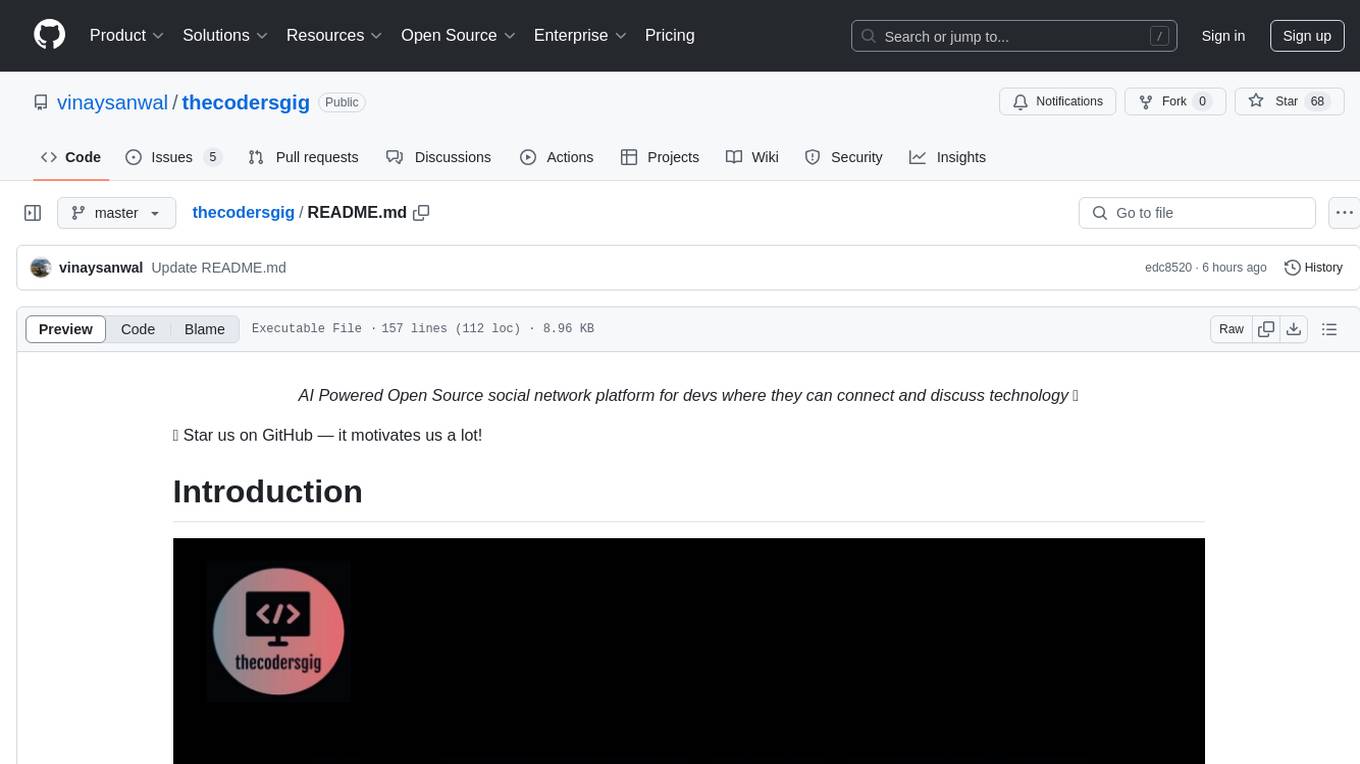
TheCodersGig is an AI-powered open-source social network platform for developers, facilitating seamless connection and collaboration. It features an integrated utility marketplace for creating plugins easily, automating backend development with scalable code. The user-friendly interface supports API integration, data models, databases, authentication, and authorization. The platform's architecture includes frontend, backend, AI services, database, marketplace, security, and DevOps layers, enabling customization and diverse integrations. Key components encompass technologies like React.js, Node.js, Python-based AI frameworks, SQL/NoSQL databases, payment gateways, security protocols, and DevOps tools for automation and scalability.
README:
AI Powered Open Source social network platform for devs where they can connect and discuss technology 🚀
⭐ Star us on GitHub — it motivates us a lot!
TheCodersGig is a robust, open-source development platform designed to revolutionize the social network platform.
It will be having integrated utility marketplace where devs can create utility plugins in a ease.
We automate your backend applications development, ensuring consistency, predictability, and adherence to the highest standards with code that’s built to scale
Our user-friendly interface fosters seamless integration of APIs, data models, databases, authentication, and authorization. Built on a flexible, plugin-based architecture, codersgig allows effortless customization in creating new plugins , utility or template etc and offers a diverse range of integrations.
The system will be composed of several layers:
- Frontend (User Interface)
- Backend (Application Logic and APIs)
- AI Services Layer
- Database Layer
- Marketplace Layer
- Security Layer
- DevOps and CI/CD Pipelines
- Technologies: React.js, Angular, or Vue.js for web; React Native or Flutter for mobile.
-
Description: The frontend will consist of a social network-style user interface for developers to connect, share knowledge, and collaborate on projects, as well as a marketplace for buying/selling developer tools, code snippets, and services.
- Social Network Features: Profiles, posts, likes, comments, direct messaging, and groups for collaboration.
- Marketplace Features: Listings for tools and services, search filters, ratings, reviews, and transaction support.
- Technologies: Node.js with Express or Django/Flask for Python; GraphQL for API querying; gRPC or RESTful APIs.
-
Description: The backend is the core of the application that will manage user sessions, social networking features, transaction handling, and AI integration.
- Microservices Architecture: Each function such as user authentication, social feed, marketplace, and AI services will run as individual microservices to allow for scalability.
- Social Features: APIs for user profiles, feed generation, comments, and notifications.
- Marketplace Management: APIs for handling product listings, transactions, digital goods delivery, and escrow services for payments.
- Technologies: Python-based AI frameworks (TensorFlow, PyTorch), natural language processing (NLP), recommendation systems, machine learning models.
-
Description: AI will power features such as content recommendation, search optimization, and even code review and generation tools.
- Recommendation Engine: Uses collaborative filtering, NLP, and machine learning to suggest relevant content (e.g., blog posts, projects, marketplace items) based on user interactions and preferences.
- AI Code Review Tools: Integrated system that analyzes code snippets shared by users and provides AI-driven feedback or optimizations.
- AI-Powered Marketplace Search: Optimizes the search and discovery of developer tools, frameworks, and services through semantic analysis.
- Auto-tagging and Categorization: Automatic tagging and categorization of user posts, projects, or marketplace items based on AI analysis of the content.
-
Technologies:
- SQL (PostgreSQL): For storing structured data like user profiles, marketplace listings, and transactions.
- NoSQL (MongoDB, Cassandra): For unstructured data such as posts, comments, and messages.
- ElasticSearch: For high-performance full-text search and indexing, especially useful for the marketplace and content recommendations.
- Description: The database layer is responsible for securely storing and retrieving all necessary data while ensuring high availability and scalability.
-
Technologies:
- Payment Gateway: Stripe, PayPal, or blockchain-based transactions.
- Smart Contracts (Optional): For secure, automated transactions in a decentralized marketplace.
-
Description: The marketplace will enable developers to buy and sell digital products (code snippets, APIs, libraries) or services (code review, freelancing).
- Payment Processing: Secure payment gateways for transactions.
- Escrow System: For holding funds during a transaction until both parties agree on completion.
- Digital Asset Management: Secure storage and transfer of digital goods.
- Technologies: OAuth 2.0 for authentication, JWT (JSON Web Tokens) for session management, SSL/TLS for secure communication.
-
Description: Security will be paramount for protecting user data, marketplace transactions, and intellectual property.
- Authentication & Authorization: User authentication using OAuth 2.0 with multi-factor authentication (MFA) for added security.
- Data Encryption: Encrypt all sensitive data at rest and in transit.
- DDOS Protection & Firewalls: Use cloud services like AWS WAF or Cloudflare for traffic filtering and protection against malicious attacks.
- Technologies: Docker for containerization, Kubernetes for orchestration, Jenkins/GitLab CI for continuous integration and deployment, Terraform for infrastructure as code.
-
Description: Implement robust DevOps pipelines for automating deployment, testing, and scaling of the services.
- Continuous Integration: Automated testing and code validation before deploying to production.
- Scalability: Use container orchestration to scale individual microservices dynamically based on demand.
- Monitoring: Integrate logging (ELK stack) and monitoring systems (Prometheus, Grafana) to ensure system health and reliability.
- Users sign up or log in using OAuth (e.g., GitHub, Google).
- JWT is issued to the client for subsequent API calls.
- MFA can be enabled for security.
- Users create profiles, post updates, and follow other developers.
- The recommendation engine suggests content based on user interactions.
- AI monitors posts, code snippets, and project discussions to offer suggestions or optimizations.
- Users browse or search for products/services using the AI-powered search.
- Transactions are initiated via a secure payment gateway.
- Funds are held in escrow until the product is delivered and both parties are satisfied.
- Users can review and rate marketplace transactions, improving the recommendation algorithm.
- Horizontal Scaling: Microservices architecture allows each component to scale independently based on load.
- Load Balancer: Use load balancers (AWS Elastic Load Balancing or NGINX) to distribute traffic evenly across services.
- Caching: Implement caching for frequently accessed data (e.g., popular posts, user profiles) using Redis or Memcached.
- CDN: Use a Content Delivery Network (CDN) to distribute static assets like images and JavaScript files globally, improving latency.
- Personalized Feed: Machine learning models track user behavior and preferences to curate a highly personalized social feed.
- Intelligent Code Suggestions: The platform analyzes shared code and provides real-time suggestions for improvement or detects errors.
- Marketplace Recommendations: AI recommends relevant tools, services, or code snippets based on a user’s activity and preferences.
- Frontend: React.js / Angular / Vue.js, React Native / Flutter.
- Backend: Node.js / Django, GraphQL, gRPC, REST APIs.
- AI/ML: TensorFlow, PyTorch, Scikit-learn, NLP libraries (spaCy).
- Databases: PostgreSQL, MongoDB, ElasticSearch.
- DevOps: Docker, Kubernetes, Jenkins, Terraform.
- Security: OAuth 2.0, JWT, SSL/TLS encryption.
This architecture will provide a scalable, secure, and highly interactive platform where developers can connect, share knowledge, and engage in a marketplace tailored to their professional needs.
To build the packages, follow these steps:
# Open a terminal (Command Prompt or PowerShell for Windows, Terminal for macOS or Linux)
# Ensure Git is installed
# Visit https://git-scm.com to download and install console Git if not already installed
npm run dev
## 📝 Youtube => https://www.youtube.com/@sanparadox1
# Clone the repository
git clone https://github.com/vinaysanwal/thecodersgig.git
For Tasks:
Click tags to check more tools for each tasksFor Jobs:
Alternative AI tools for thecodersgig
Similar Open Source Tools

thecodersgig
TheCodersGig is an AI-powered open-source social network platform for developers, facilitating seamless connection and collaboration. It features an integrated utility marketplace for creating plugins easily, automating backend development with scalable code. The user-friendly interface supports API integration, data models, databases, authentication, and authorization. The platform's architecture includes frontend, backend, AI services, database, marketplace, security, and DevOps layers, enabling customization and diverse integrations. Key components encompass technologies like React.js, Node.js, Python-based AI frameworks, SQL/NoSQL databases, payment gateways, security protocols, and DevOps tools for automation and scalability.

koog
Koog is a Kotlin-based framework for building and running AI agents entirely in idiomatic Kotlin. It allows users to create agents that interact with tools, handle complex workflows, and communicate with users. Key features include pure Kotlin implementation, MCP integration, embedding capabilities, custom tool creation, ready-to-use components, intelligent history compression, powerful streaming API, persistent agent memory, comprehensive tracing, flexible graph workflows, modular feature system, scalable architecture, and multiplatform support.
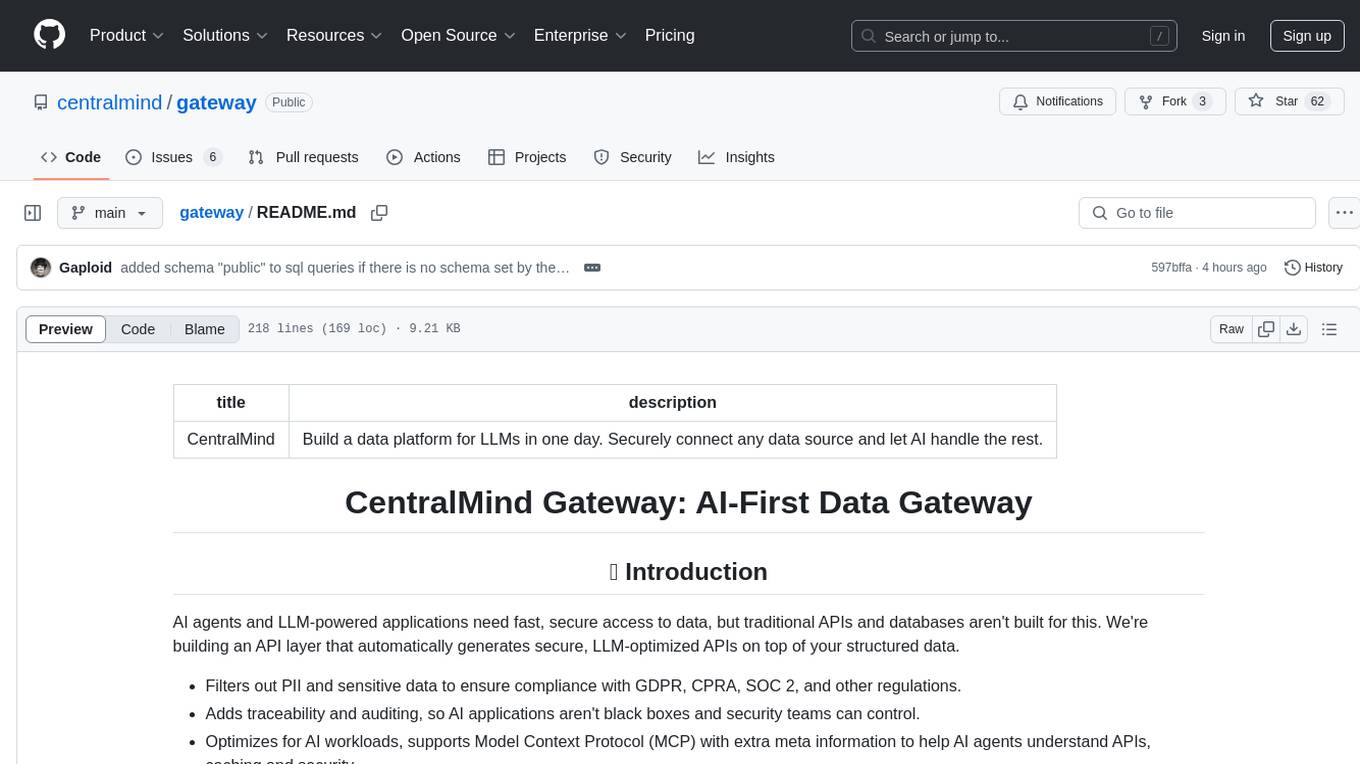
gateway
CentralMind Gateway is an AI-first data gateway that securely connects any data source and automatically generates secure, LLM-optimized APIs. It filters out sensitive data, adds traceability, and optimizes for AI workloads. Suitable for companies deploying AI agents for customer support and analytics.
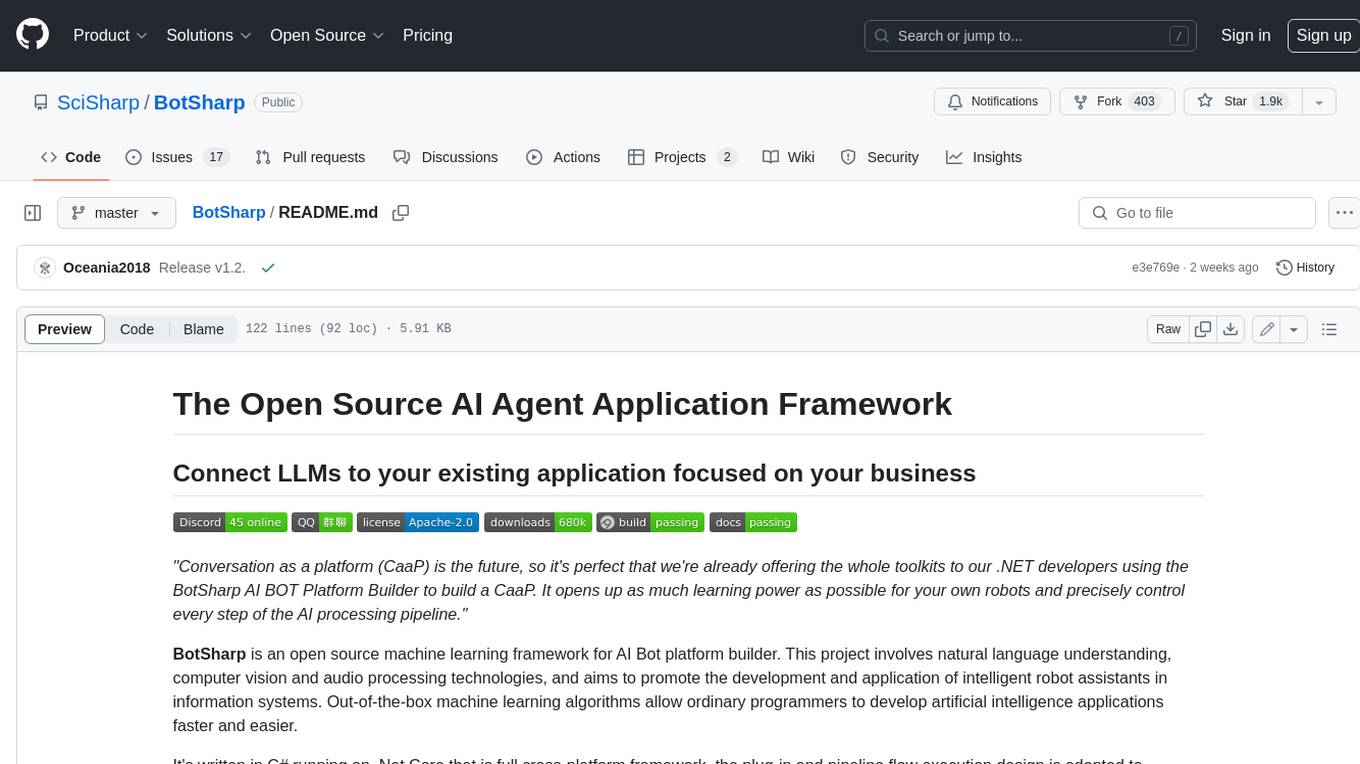
BotSharp
BotSharp is an open-source machine learning framework for building AI bot platforms. It provides a comprehensive set of tools and components for developing and deploying intelligent virtual assistants. BotSharp is designed to be modular and extensible, allowing developers to easily integrate it with their existing systems and applications. With BotSharp, you can quickly and easily create AI-powered chatbots, virtual assistants, and other conversational AI applications.
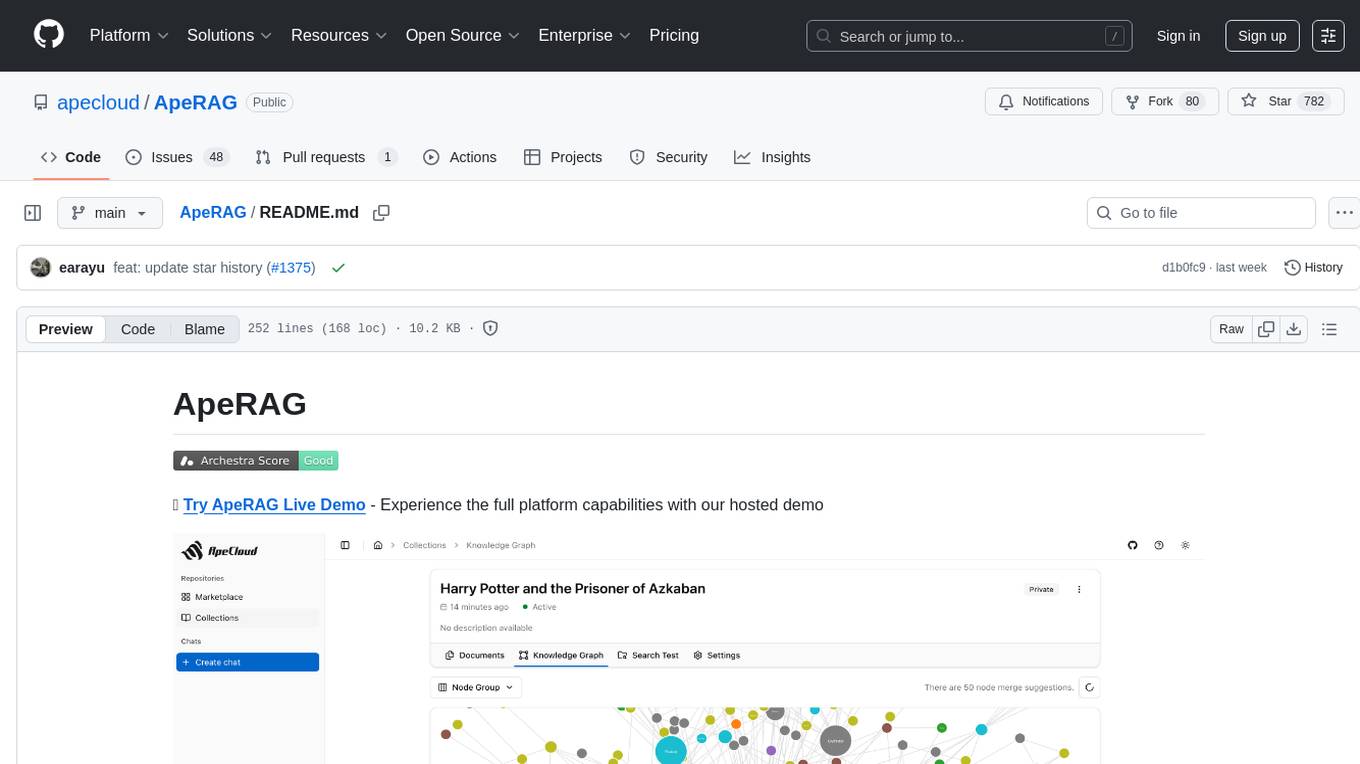
ApeRAG
ApeRAG is a production-ready platform for Retrieval-Augmented Generation (RAG) that combines Graph RAG, vector search, and full-text search with advanced AI agents. It is ideal for building Knowledge Graphs, Context Engineering, and deploying intelligent AI agents for autonomous search and reasoning across knowledge bases. The platform offers features like advanced index types, intelligent AI agents with MCP support, enhanced Graph RAG with entity normalization, multimodal processing, hybrid retrieval engine, MinerU integration for document parsing, production-grade deployment with Kubernetes, enterprise management features, MCP integration, and developer-friendly tools for customization and contribution.
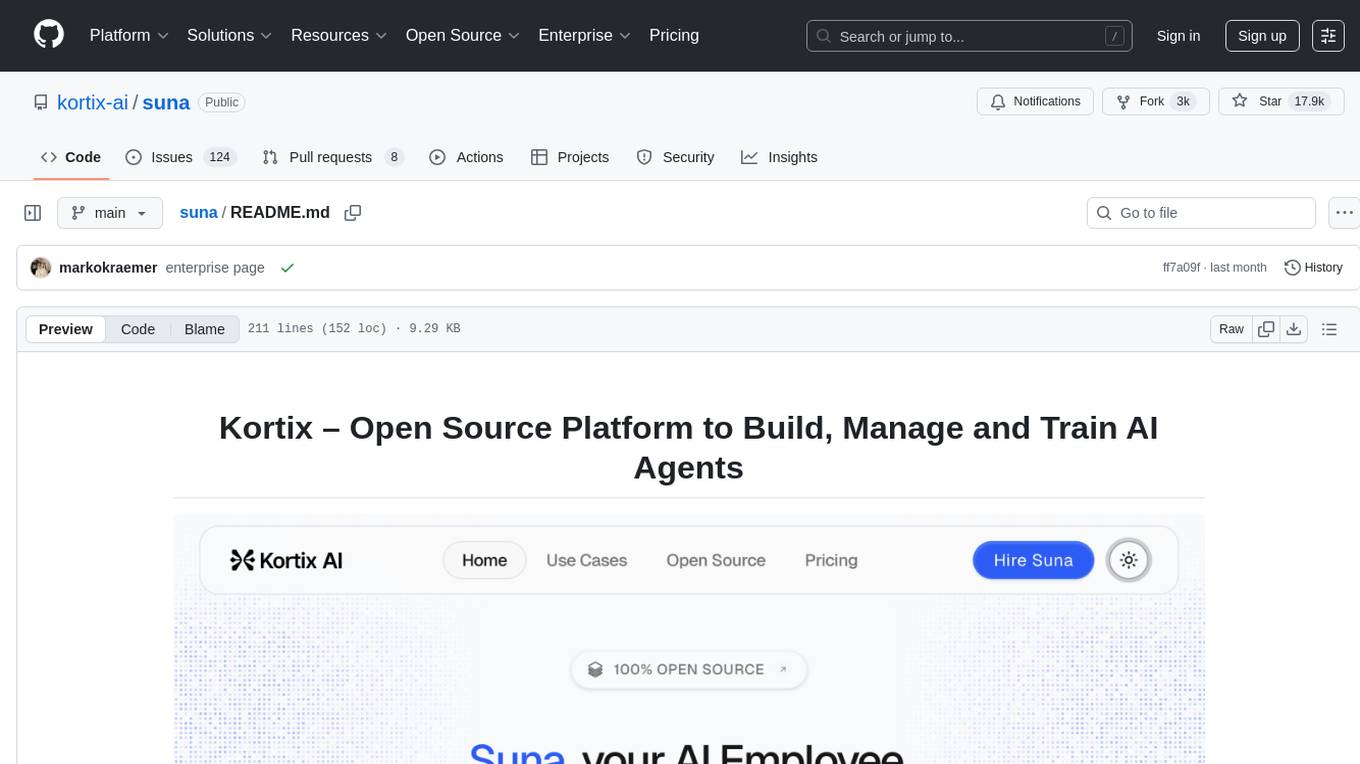
suna
Kortix is an open-source platform designed to build, manage, and train AI agents for various tasks. It allows users to create autonomous agents, from general-purpose assistants to specialized automation tools. The platform offers capabilities such as browser automation, file management, web intelligence, system operations, API integrations, and agent building tools. Users can create custom agents tailored to specific domains, workflows, or business needs, enabling tasks like research & analysis, browser automation, file & document management, data processing & analysis, and system administration.
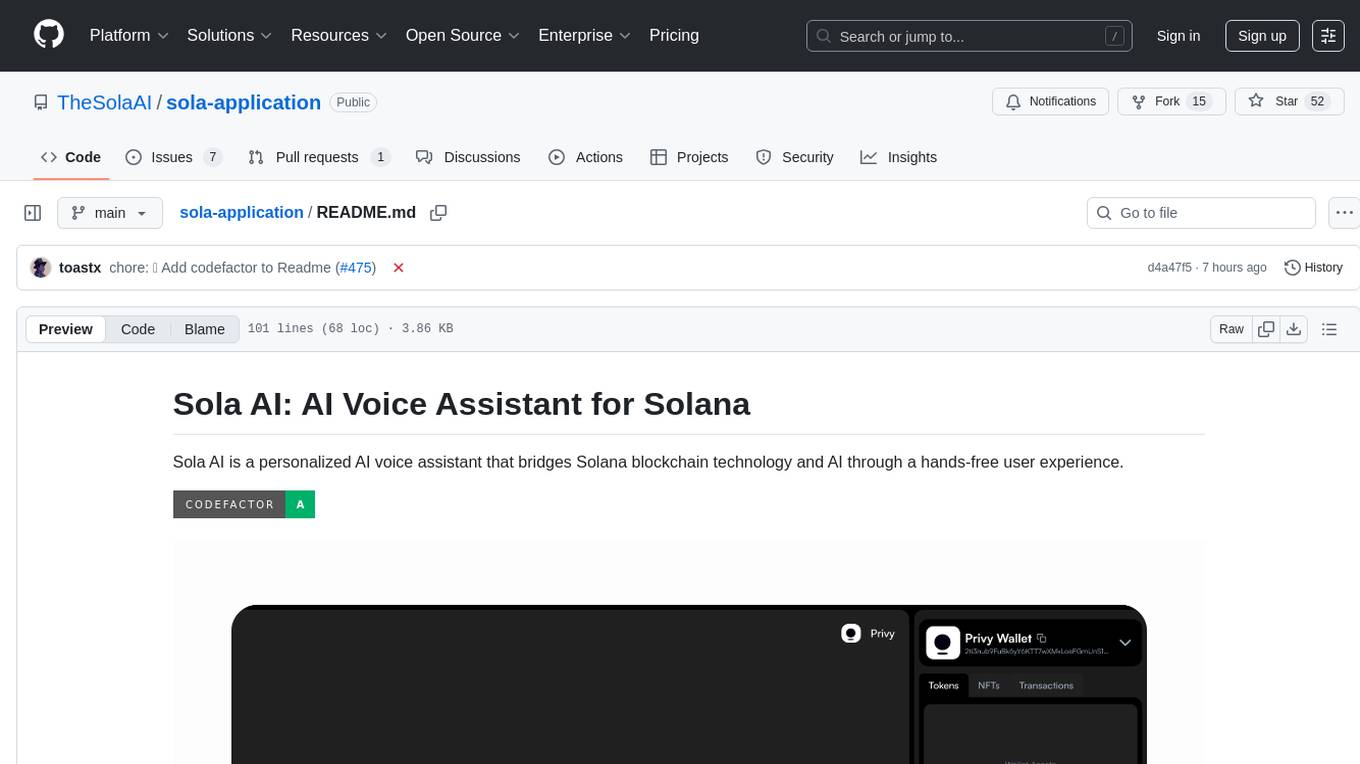
sola-application
Sola AI is a personalized AI voice assistant that integrates Solana blockchain technology and AI through a hands-free user experience. It provides real-time communication using WebRTC, modern frontend built with Next.js and Tailwind CSS, scalable backend with microservices architecture, blockchain data filtering, and supports Solana on-chain interactions. Core components include Sola AI Application for user input processing, OpenAI integration, microservices routing, and AI-powered intelligent interface. It also includes Data Service for blockchain data processing, Wallet Service for transaction handling, and User Service for managing user data. The workflow involves receiving user input, fetching and filtering blockchain data, building transactions, executing transactions, and responding to the user. Installation involves cloning the repository, installing dependencies, setting up environment variables, and starting the development server.
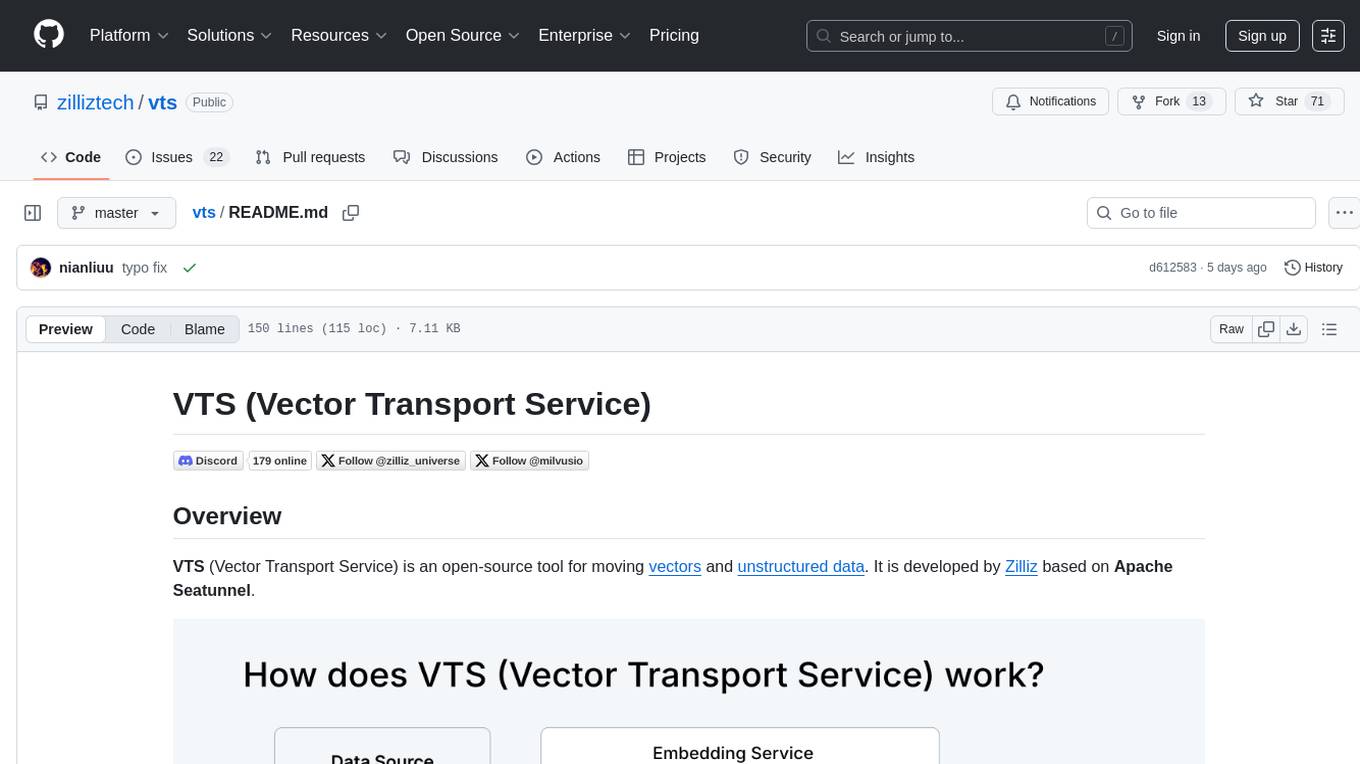
vts
VTS (Vector Transport Service) is an open-source tool developed by Zilliz based on Apache Seatunnel for moving vectors and unstructured data. It addresses data migration needs, supports real-time data streaming and offline import, simplifies unstructured data transformation, and ensures end-to-end data quality. Core capabilities include rich connectors, stream and batch processing, distributed snapshot support, high performance, and real-time monitoring. Future developments include incremental synchronization, advanced data transformation, and enhanced monitoring. VTS supports various connectors for data migration and offers advanced features like Transformers, cluster mode deployment, RESTful API, Docker deployment, and more.
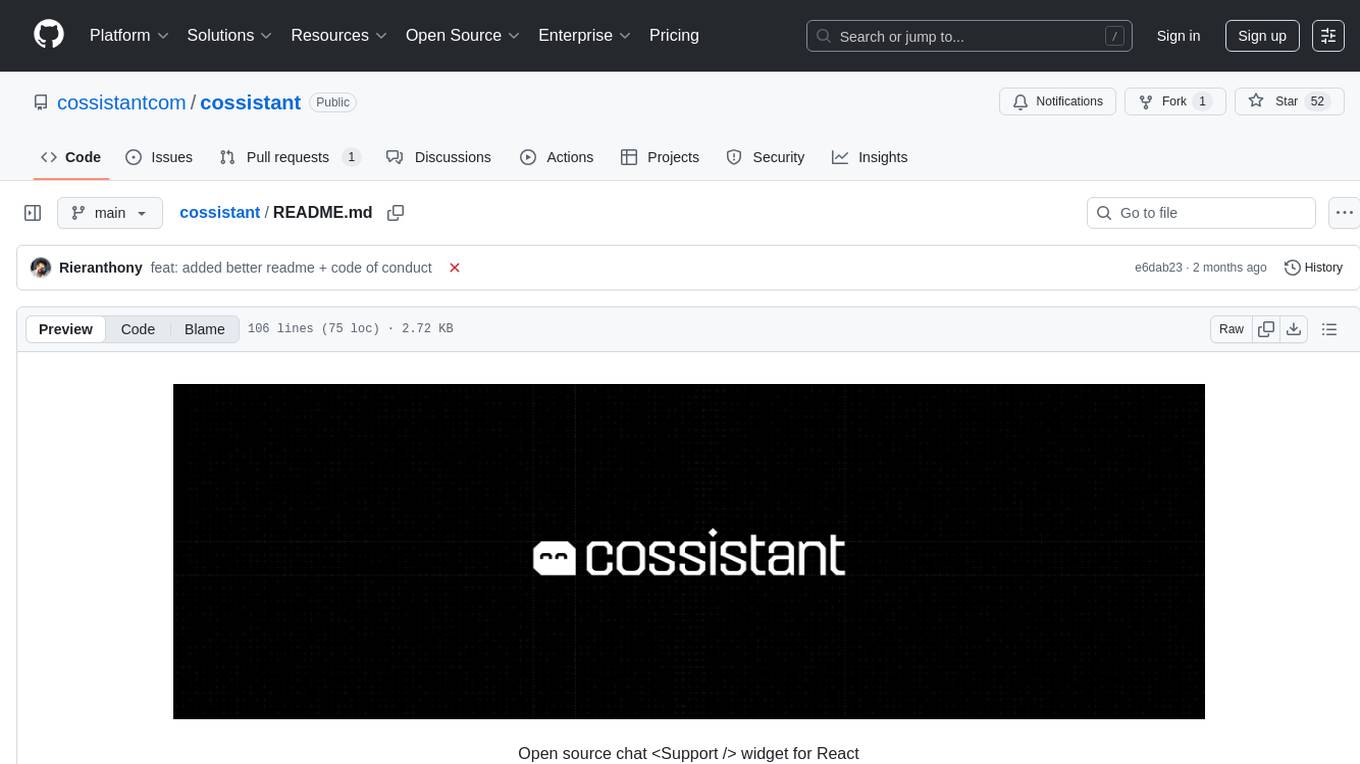
cossistant
Cossistant is an open source chat support widget tailored for the React ecosystem. It offers headless components for building customizable chat interfaces, real-time messaging with WebSocket technology, and tools for managing customer conversations. The tool is API-first, self-hosted, developer-friendly with TypeScript support, and provides complete integration flexibility. It uses technologies like Next.js, TailwindCSS, and WebSockets, and supports databases like PlanetScale for production and DBgin for local development. Cossistant is ideal for developers seeking a versatile chat solution that can be easily integrated into their applications.

WeKnora
WeKnora is a document understanding and semantic retrieval framework based on large language models (LLM), designed specifically for scenarios with complex structures and heterogeneous content. The framework adopts a modular architecture, integrating multimodal preprocessing, semantic vector indexing, intelligent recall, and large model generation reasoning to build an efficient and controllable document question-answering process. The core retrieval process is based on the RAG (Retrieval-Augmented Generation) mechanism, combining context-relevant segments with language models to achieve higher-quality semantic answers. It supports various document formats, intelligent inference, flexible extension, efficient retrieval, ease of use, and security and control. Suitable for enterprise knowledge management, scientific literature analysis, product technical support, legal compliance review, and medical knowledge assistance.
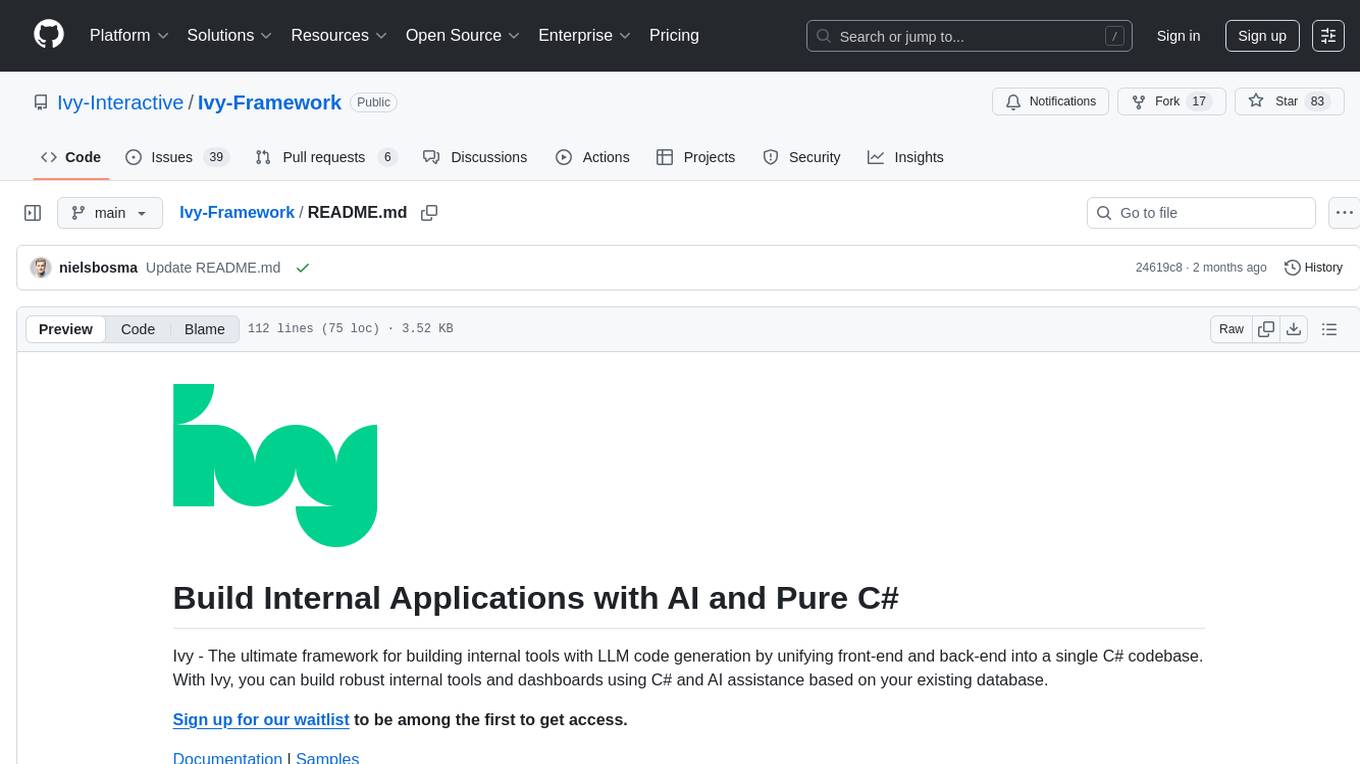
Ivy-Framework
Ivy-Framework is a powerful tool for building internal applications with AI assistance using C# codebase. It provides a CLI for project initialization, authentication integrations, database support, LLM code generation, secrets management, container deployment, hot reload, dependency injection, state management, routing, and external widget framework. Users can easily create data tables for sorting, filtering, and pagination. The framework offers a seamless integration of front-end and back-end development, making it ideal for developing robust internal tools and dashboards.
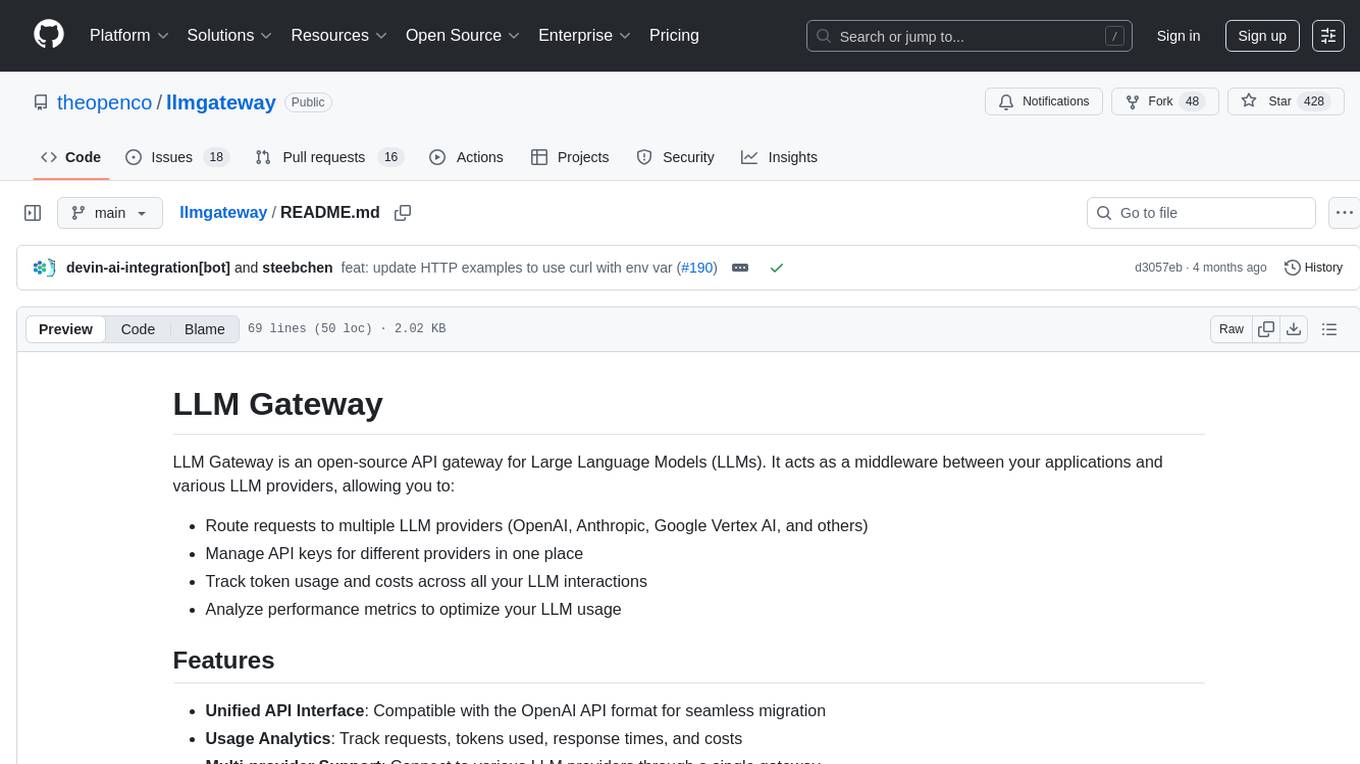
llmgateway
The llmgateway repository is a tool that provides a gateway for interacting with various LLM (Large Language Model) models. It allows users to easily access and utilize pre-trained language models for tasks such as text generation, sentiment analysis, and language translation. The tool simplifies the process of integrating LLMs into applications and workflows, enabling developers to leverage the power of state-of-the-art language models for various natural language processing tasks.
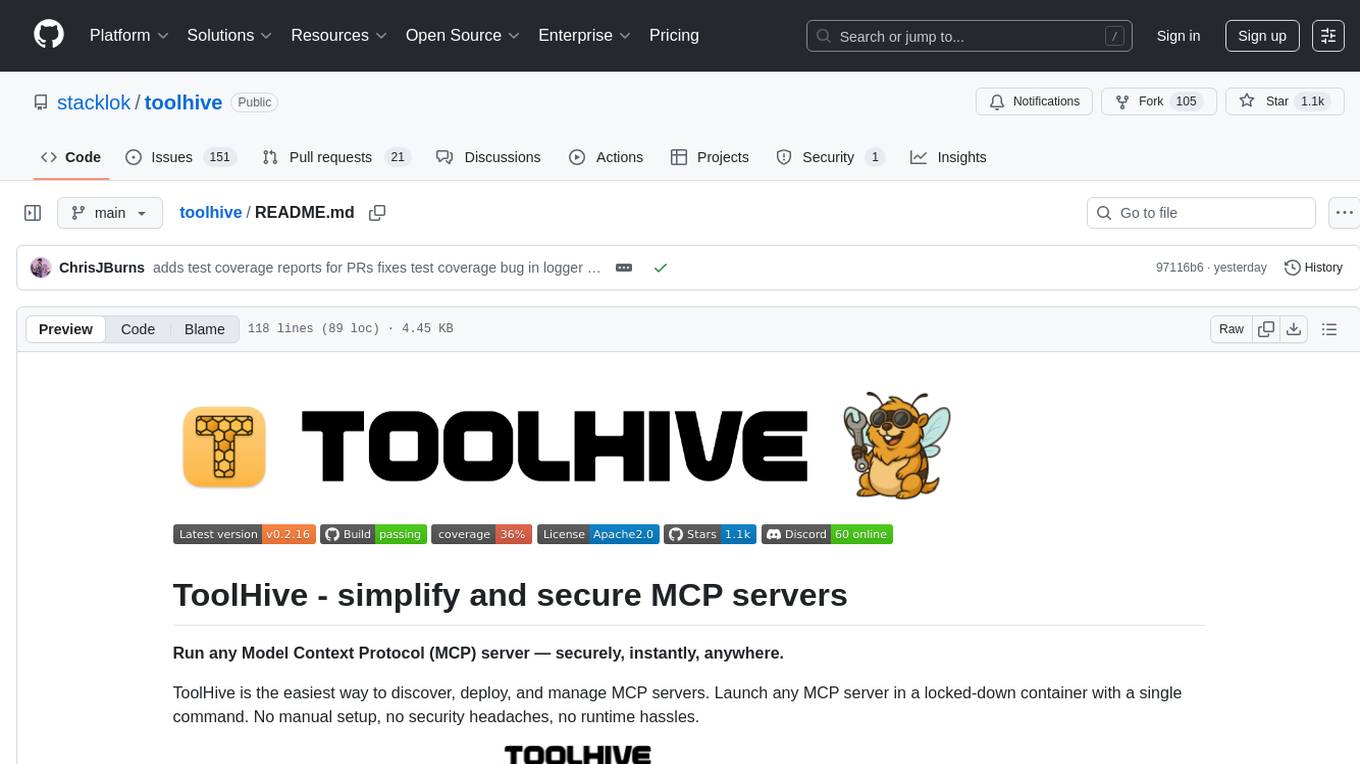
toolhive
ToolHive is a tool designed to simplify and secure Model Context Protocol (MCP) servers. It allows users to easily discover, deploy, and manage MCP servers by launching them in isolated containers with minimal setup and security concerns. The tool offers instant deployment, secure default settings, compatibility with Docker and Kubernetes, seamless integration with popular clients, and availability as a GUI desktop app, CLI, and Kubernetes Operator.
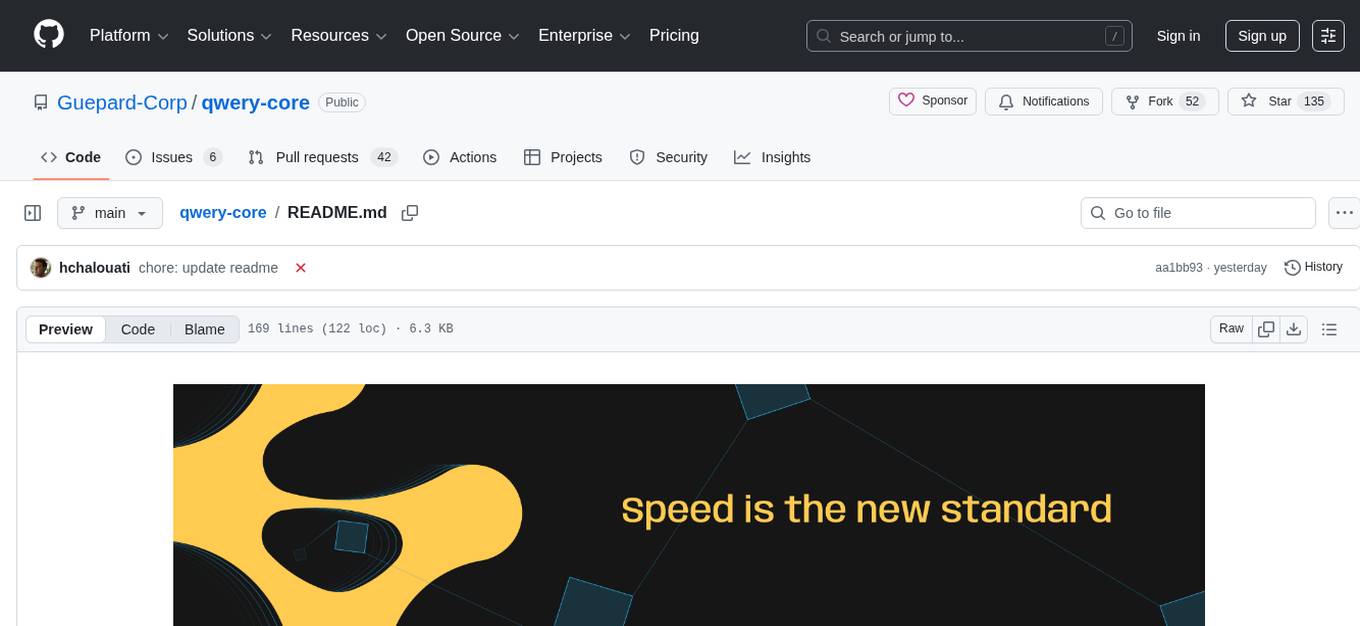
qwery-core
Qwery is a platform for querying and visualizing data using natural language without technical knowledge. It seamlessly integrates with various datasources, generates optimized queries, and delivers outcomes like result sets, dashboards, and APIs. Features include natural language querying, multi-database support, AI-powered agents, visual data apps, desktop & cloud options, template library, and extensibility through plugins. The project is under active development and not yet suitable for production use.
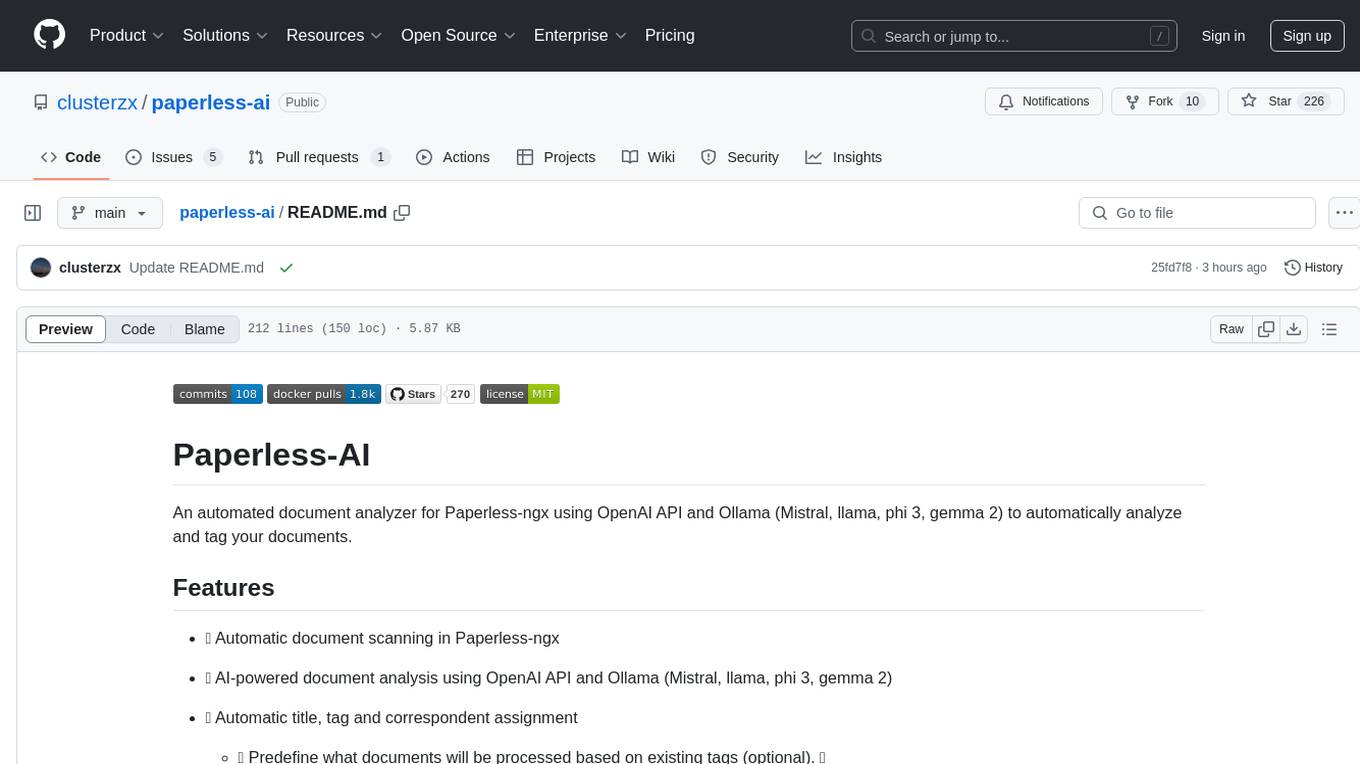
paperless-ai
Paperless-AI is an automated document analyzer tool designed for Paperless-ngx users. It utilizes the OpenAI API and Ollama (Mistral, llama, phi 3, gemma 2) to automatically scan, analyze, and tag documents. The tool offers features such as automatic document scanning, AI-powered document analysis, automatic title and tag assignment, manual mode for analyzing documents, easy setup through a web interface, document processing dashboard, error handling, and Docker support. Users can configure the tool through a web interface and access a debug interface for monitoring and troubleshooting. Paperless-AI aims to streamline document organization and analysis processes for users with access to Paperless-ngx and AI capabilities.

starwhale
Starwhale is an MLOps/LLMOps platform that brings efficiency and standardization to machine learning operations. It streamlines the model development lifecycle, enabling teams to optimize workflows around key areas like model building, evaluation, release, and fine-tuning. Starwhale abstracts Model, Runtime, and Dataset as first-class citizens, providing tailored capabilities for common workflow scenarios including Models Evaluation, Live Demo, and LLM Fine-tuning. It is an open-source platform designed for clarity and ease of use, empowering developers to build customized MLOps features tailored to their needs.
For similar tasks

thecodersgig
TheCodersGig is an AI-powered open-source social network platform for developers, facilitating seamless connection and collaboration. It features an integrated utility marketplace for creating plugins easily, automating backend development with scalable code. The user-friendly interface supports API integration, data models, databases, authentication, and authorization. The platform's architecture includes frontend, backend, AI services, database, marketplace, security, and DevOps layers, enabling customization and diverse integrations. Key components encompass technologies like React.js, Node.js, Python-based AI frameworks, SQL/NoSQL databases, payment gateways, security protocols, and DevOps tools for automation and scalability.
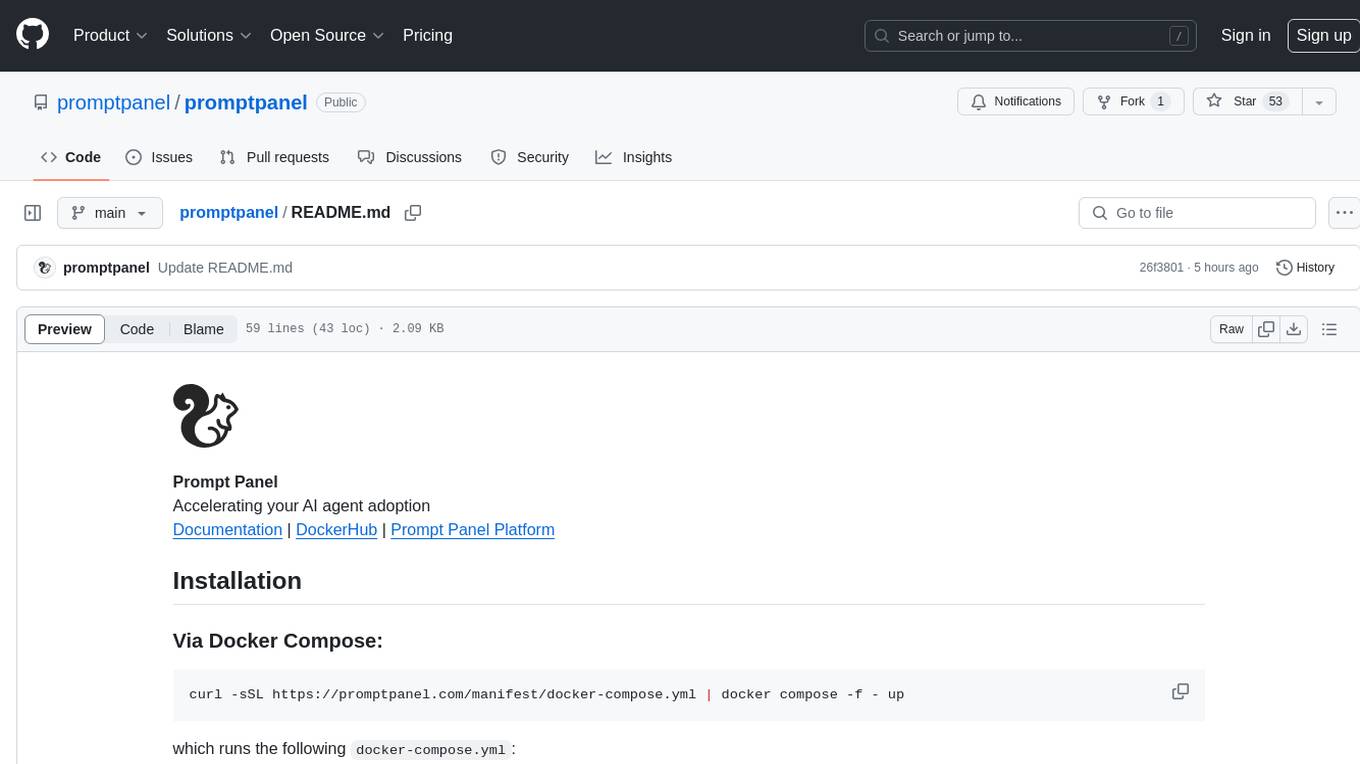
promptpanel
Prompt Panel is a tool designed to accelerate the adoption of AI agents by providing a platform where users can run large language models across any inference provider, create custom agent plugins, and use their own data safely. The tool allows users to break free from walled-gardens and have full control over their models, conversations, and logic. With Prompt Panel, users can pair their data with any language model, online or offline, and customize the system to meet their unique business needs without any restrictions.
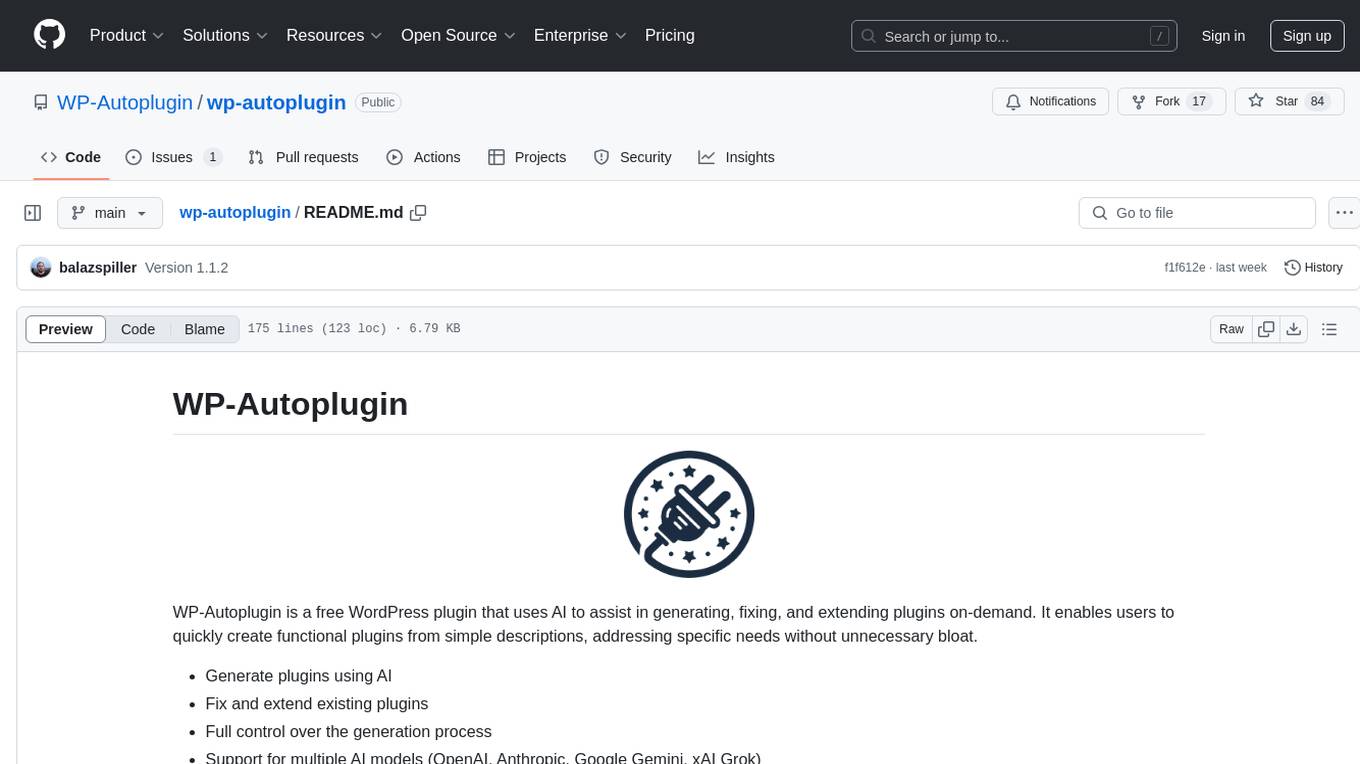
wp-autoplugin
WP-Autoplugin is a free WordPress plugin that uses AI to assist in generating, fixing, and extending plugins on-demand. It enables users to quickly create functional plugins from simple descriptions, addressing specific needs without unnecessary bloat. Users can generate plugins using AI, fix and extend existing plugins, have full control over the generation process, view the list of generated plugins for easy management, and auto-detect fatal errors. The plugin offers practical solutions for creating lightweight alternatives, custom solutions, and developer foundations. It supports various AI models like GPT-3.5 Turbo, GPT-4, Claude 3.5 Sonnet, Google Gemini Flash 2.0, xAI Grok-beta, and more. WP-Autoplugin is completely free, open-source, privacy-focused, and allows users to bring their own API key for AI usage.
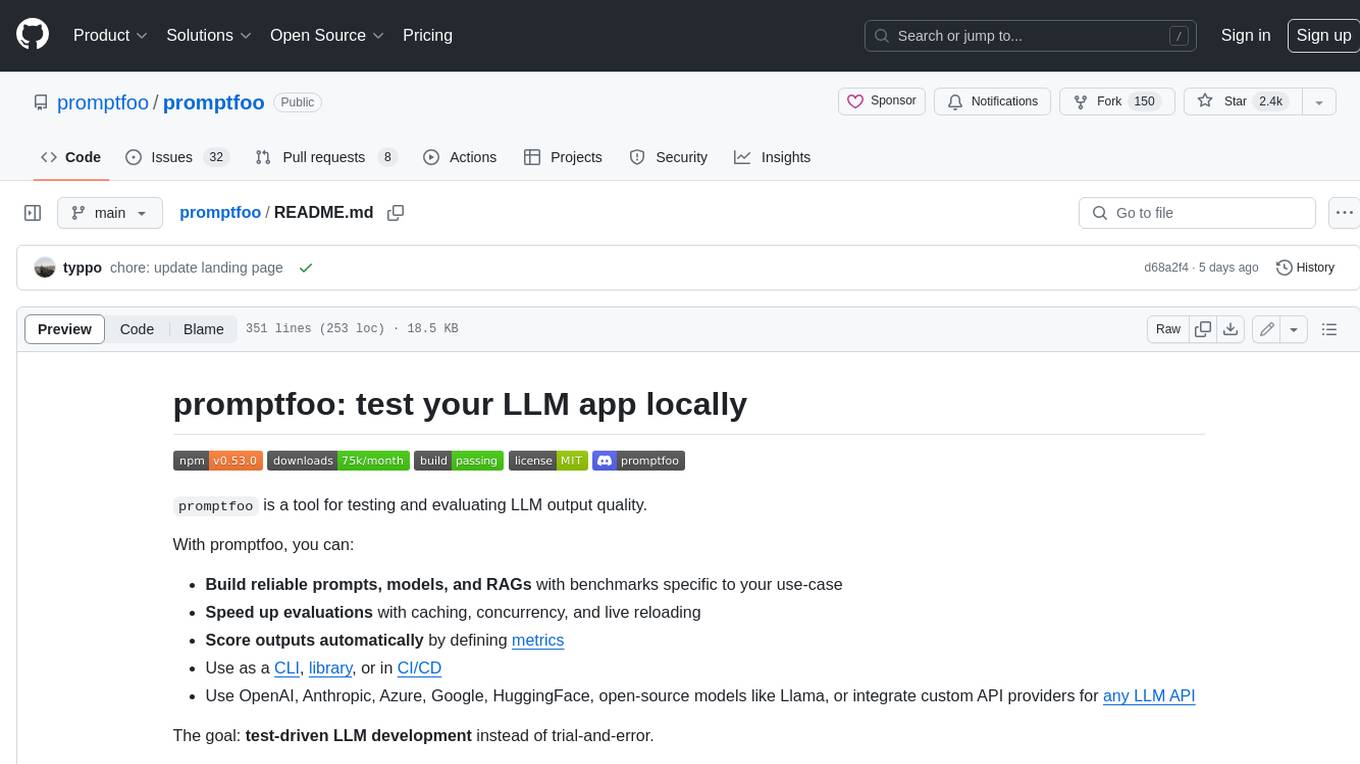
promptfoo
Promptfoo is a tool for testing and evaluating LLM output quality. With promptfoo, you can build reliable prompts, models, and RAGs with benchmarks specific to your use-case, speed up evaluations with caching, concurrency, and live reloading, score outputs automatically by defining metrics, use as a CLI, library, or in CI/CD, and use OpenAI, Anthropic, Azure, Google, HuggingFace, open-source models like Llama, or integrate custom API providers for any LLM API.
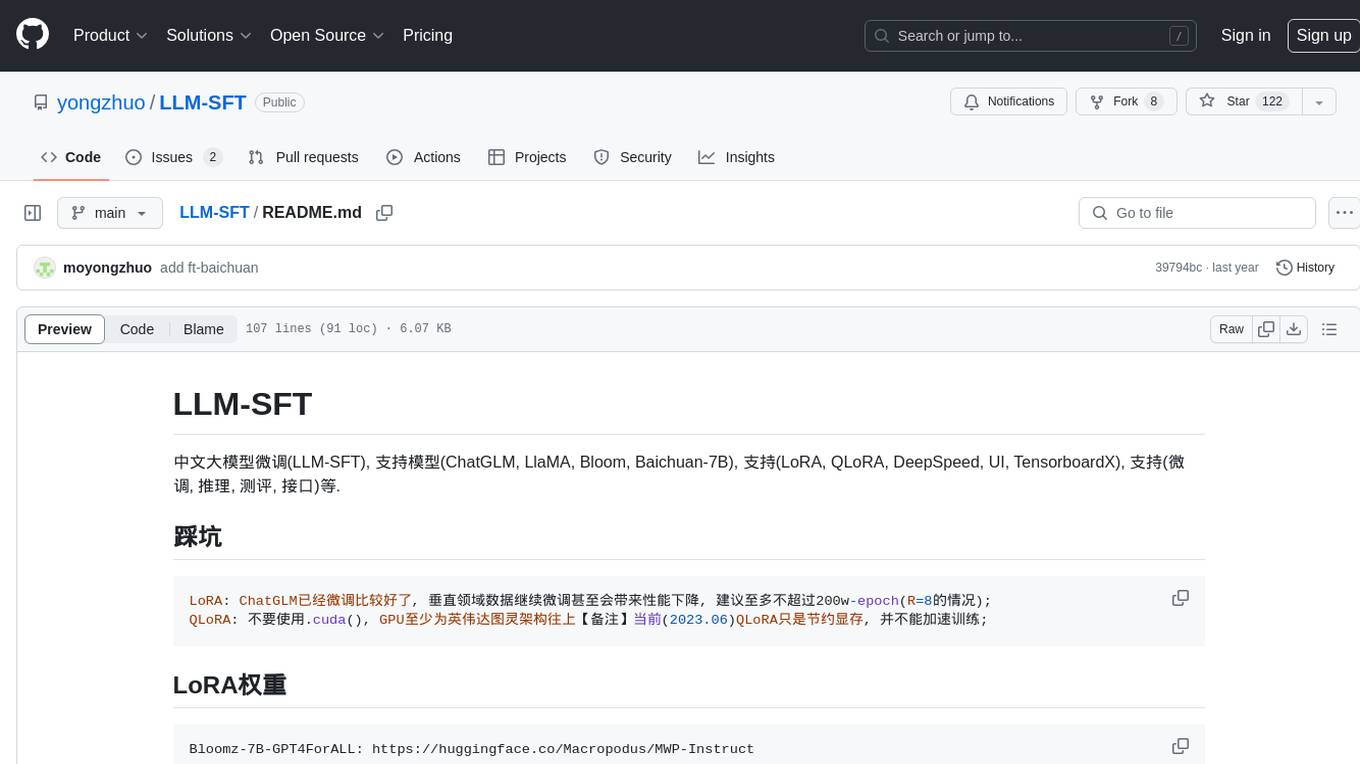
LLM-SFT
LLM-SFT is a Chinese large model fine-tuning tool that supports models such as ChatGLM, LlaMA, Bloom, Baichuan-7B, and frameworks like LoRA, QLoRA, DeepSpeed, UI, and TensorboardX. It facilitates tasks like fine-tuning, inference, evaluation, and API integration. The tool provides pre-trained weights for various models and datasets for Chinese language processing. It requires specific versions of libraries like transformers and torch for different functionalities.
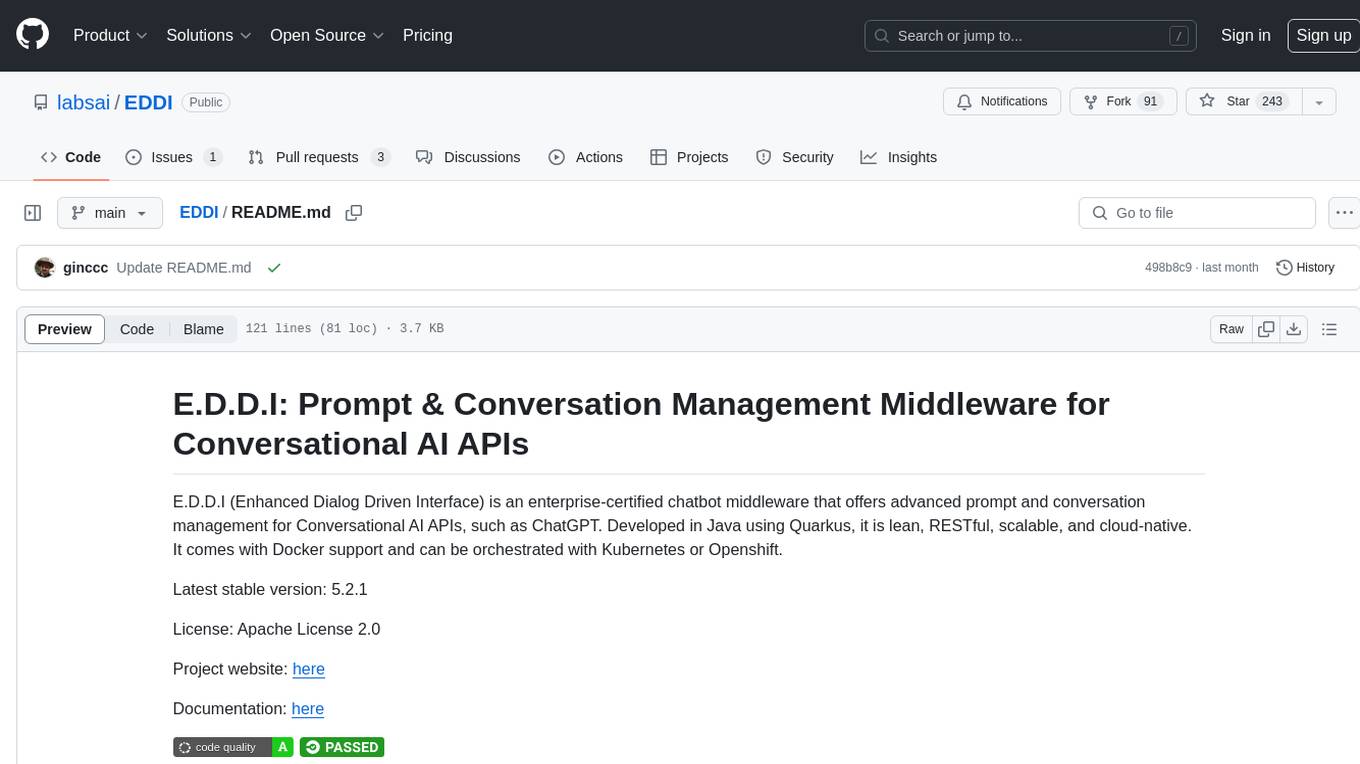
EDDI
E.D.D.I (Enhanced Dialog Driven Interface) is an enterprise-certified chatbot middleware that offers advanced prompt and conversation management for Conversational AI APIs. Developed in Java using Quarkus, it is lean, RESTful, scalable, and cloud-native. E.D.D.I is highly scalable and designed to efficiently manage conversations in AI-driven applications, with seamless API integration capabilities. Notable features include configurable NLP and Behavior rules, support for multiple chatbots running concurrently, and integration with MongoDB, OAuth 2.0, and HTML/CSS/JavaScript for UI. The project requires Java 21, Maven 3.8.4, and MongoDB >= 5.0 to run. It can be built as a Docker image and deployed using Docker or Kubernetes, with additional support for integration testing and monitoring through Prometheus and Kubernetes endpoints.
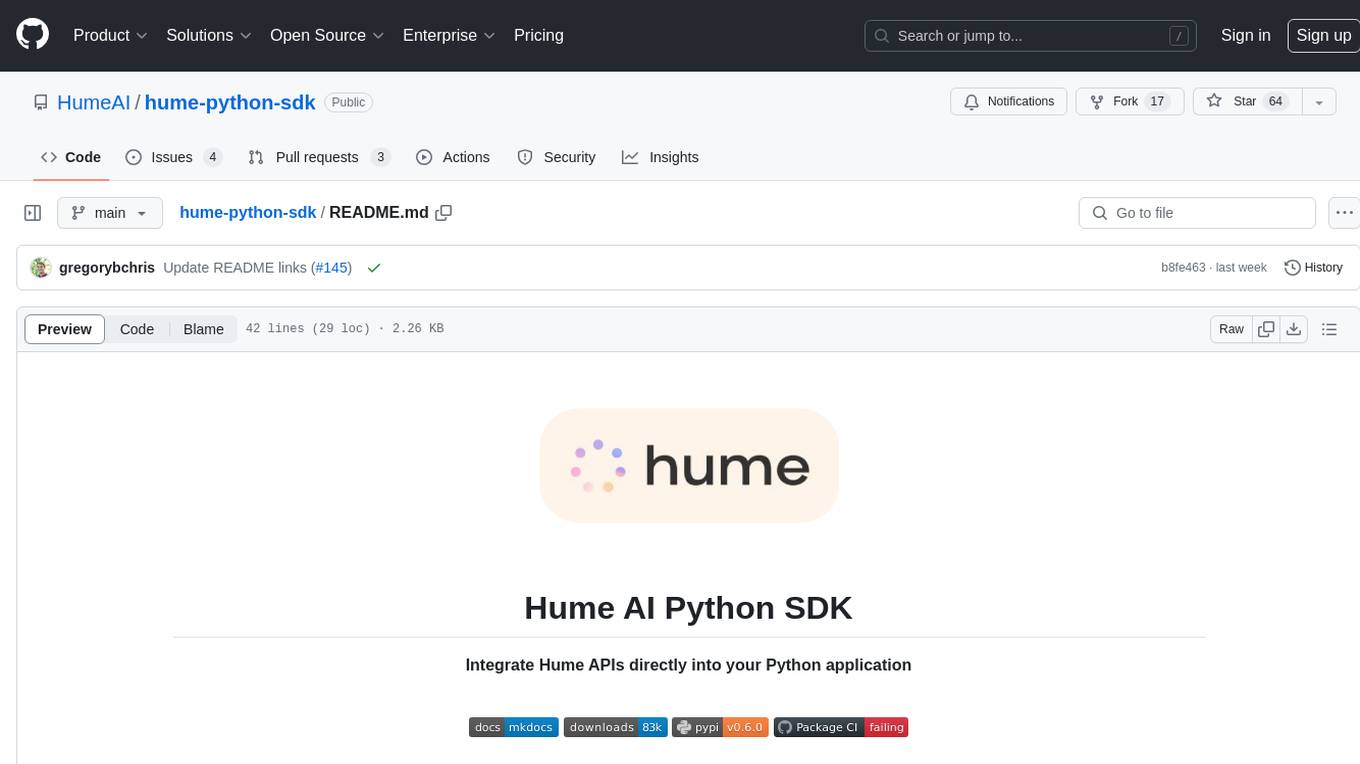
hume-python-sdk
The Hume AI Python SDK allows users to integrate Hume APIs directly into their Python applications. Users can access complete documentation, quickstart guides, and example notebooks to get started. The SDK is designed to provide support for Hume's expressive communication platform built on scientific research. Users are encouraged to create an account at beta.hume.ai and stay updated on changes through Discord. The SDK may undergo breaking changes to improve tooling and ensure reliable releases in the future.
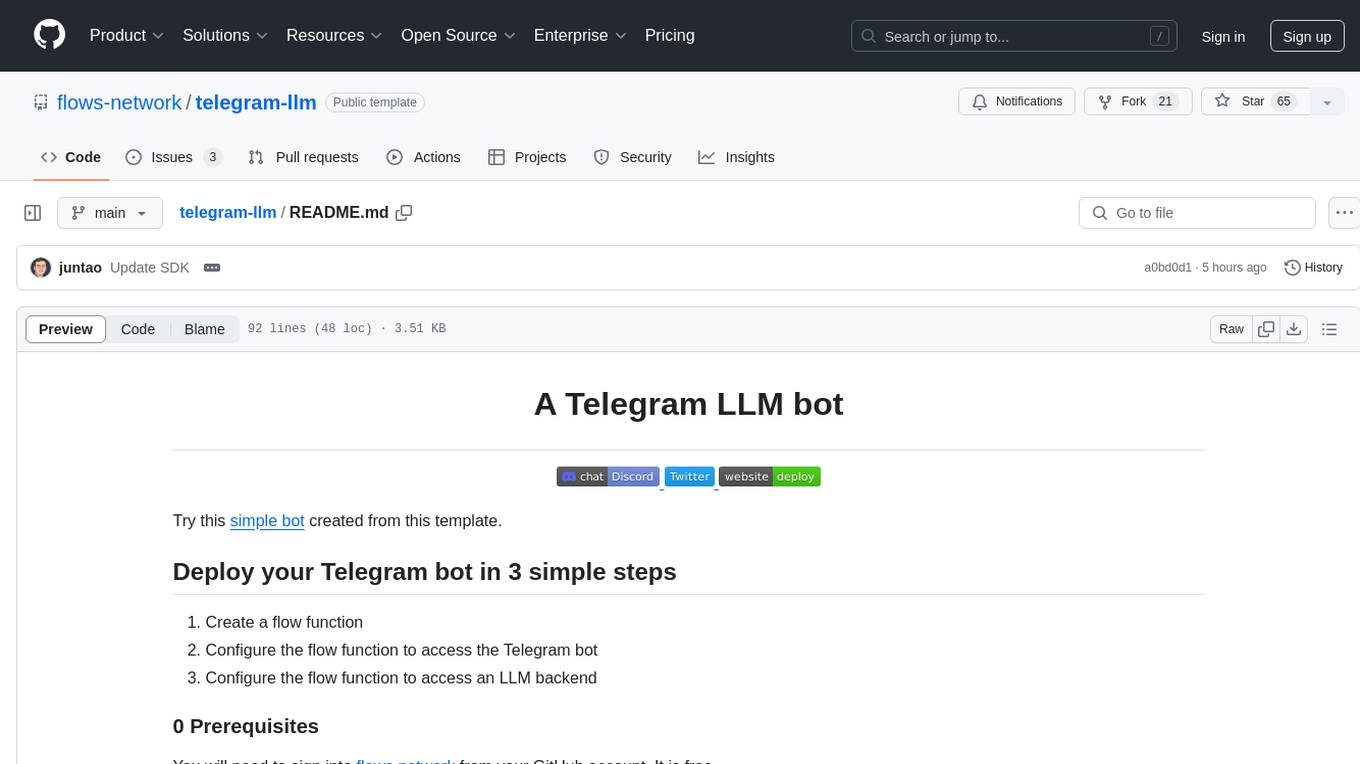
telegram-llm
A Telegram LLM bot that allows users to deploy their own Telegram bot in 3 simple steps by creating a flow function, configuring access to the Telegram bot, and connecting to an LLM backend. Users need to sign into flows.network, have a bot token from Telegram, and an OpenAI API key. The bot can be customized with ChatGPT prompts and integrated with OpenAI and Telegram for various functionalities.
For similar jobs

sweep
Sweep is an AI junior developer that turns bugs and feature requests into code changes. It automatically handles developer experience improvements like adding type hints and improving test coverage.

teams-ai
The Teams AI Library is a software development kit (SDK) that helps developers create bots that can interact with Teams and Microsoft 365 applications. It is built on top of the Bot Framework SDK and simplifies the process of developing bots that interact with Teams' artificial intelligence capabilities. The SDK is available for JavaScript/TypeScript, .NET, and Python.

ai-guide
This guide is dedicated to Large Language Models (LLMs) that you can run on your home computer. It assumes your PC is a lower-end, non-gaming setup.

classifai
Supercharge WordPress Content Workflows and Engagement with Artificial Intelligence. Tap into leading cloud-based services like OpenAI, Microsoft Azure AI, Google Gemini and IBM Watson to augment your WordPress-powered websites. Publish content faster while improving SEO performance and increasing audience engagement. ClassifAI integrates Artificial Intelligence and Machine Learning technologies to lighten your workload and eliminate tedious tasks, giving you more time to create original content that matters.

chatbot-ui
Chatbot UI is an open-source AI chat app that allows users to create and deploy their own AI chatbots. It is easy to use and can be customized to fit any need. Chatbot UI is perfect for businesses, developers, and anyone who wants to create a chatbot.

BricksLLM
BricksLLM is a cloud native AI gateway written in Go. Currently, it provides native support for OpenAI, Anthropic, Azure OpenAI and vLLM. BricksLLM aims to provide enterprise level infrastructure that can power any LLM production use cases. Here are some use cases for BricksLLM: * Set LLM usage limits for users on different pricing tiers * Track LLM usage on a per user and per organization basis * Block or redact requests containing PIIs * Improve LLM reliability with failovers, retries and caching * Distribute API keys with rate limits and cost limits for internal development/production use cases * Distribute API keys with rate limits and cost limits for students

uAgents
uAgents is a Python library developed by Fetch.ai that allows for the creation of autonomous AI agents. These agents can perform various tasks on a schedule or take action on various events. uAgents are easy to create and manage, and they are connected to a fast-growing network of other uAgents. They are also secure, with cryptographically secured messages and wallets.

griptape
Griptape is a modular Python framework for building AI-powered applications that securely connect to your enterprise data and APIs. It offers developers the ability to maintain control and flexibility at every step. Griptape's core components include Structures (Agents, Pipelines, and Workflows), Tasks, Tools, Memory (Conversation Memory, Task Memory, and Meta Memory), Drivers (Prompt and Embedding Drivers, Vector Store Drivers, Image Generation Drivers, Image Query Drivers, SQL Drivers, Web Scraper Drivers, and Conversation Memory Drivers), Engines (Query Engines, Extraction Engines, Summary Engines, Image Generation Engines, and Image Query Engines), and additional components (Rulesets, Loaders, Artifacts, Chunkers, and Tokenizers). Griptape enables developers to create AI-powered applications with ease and efficiency.